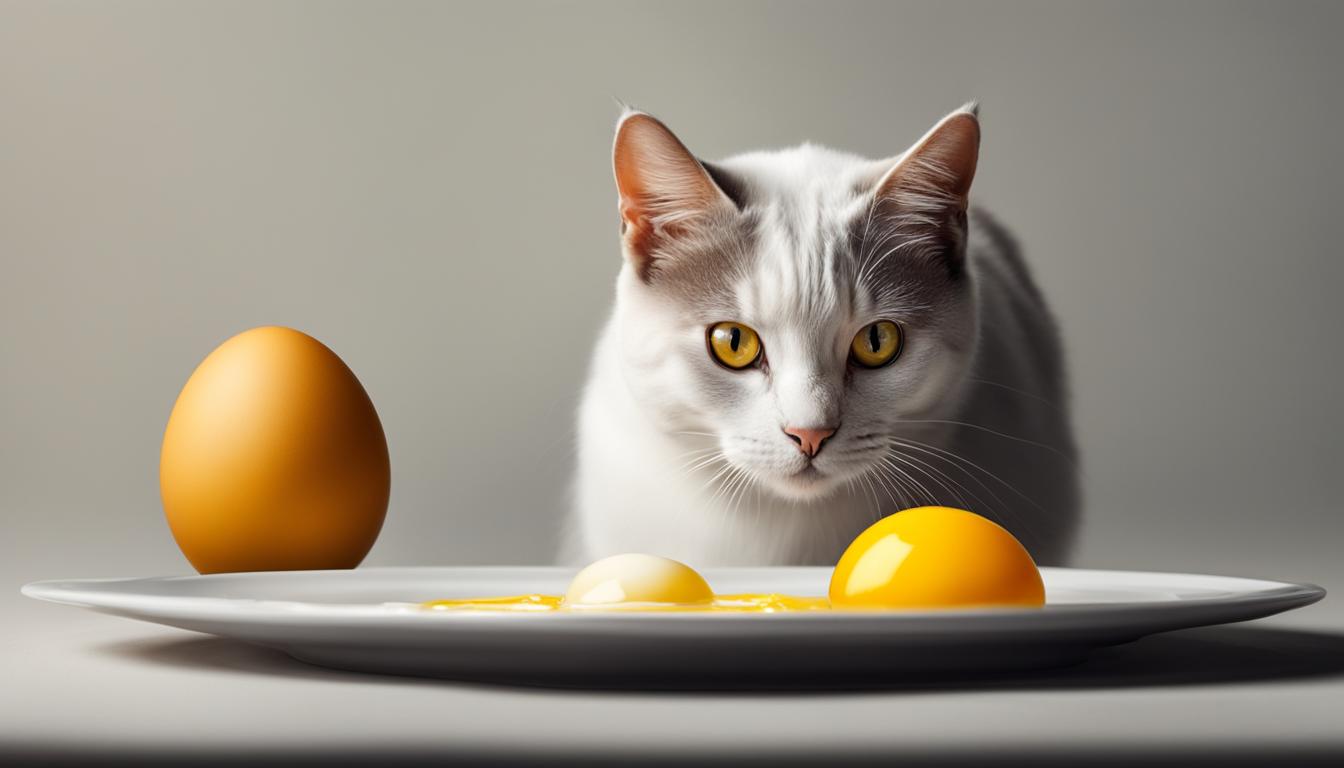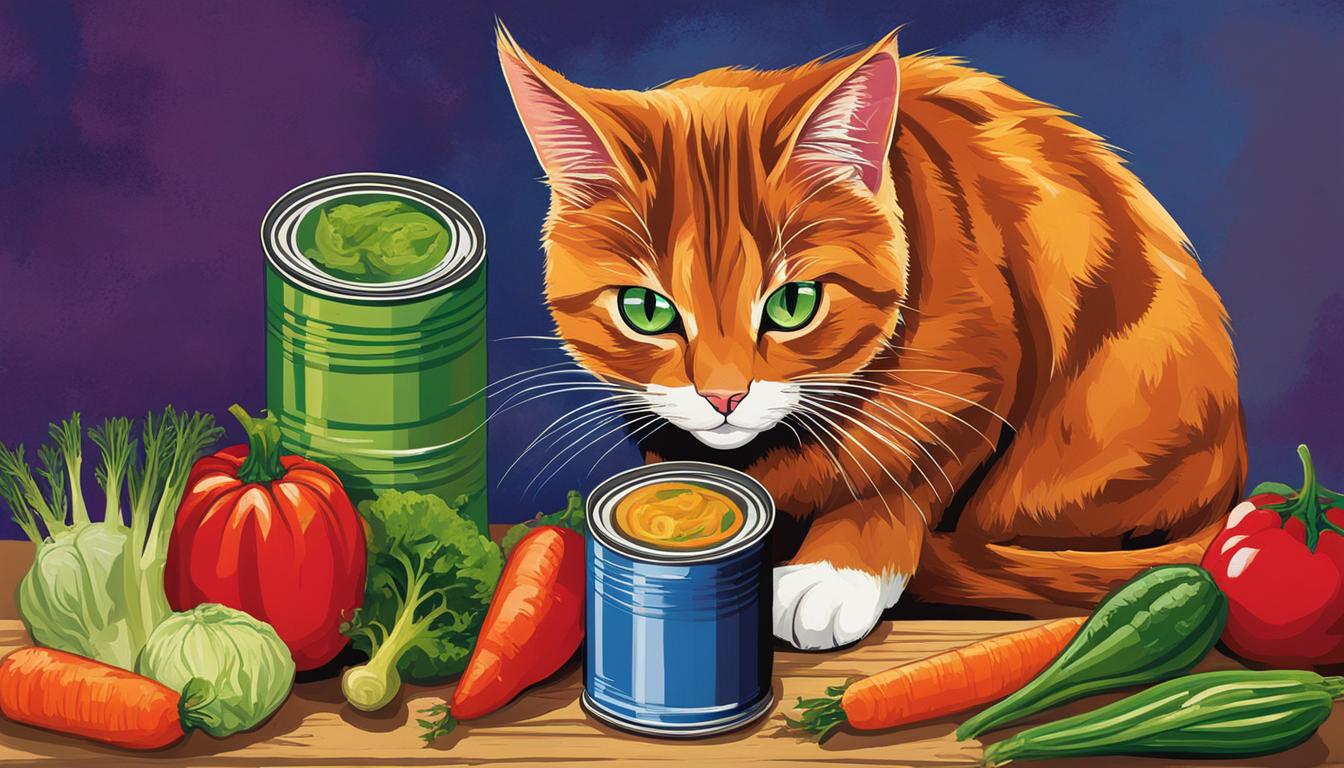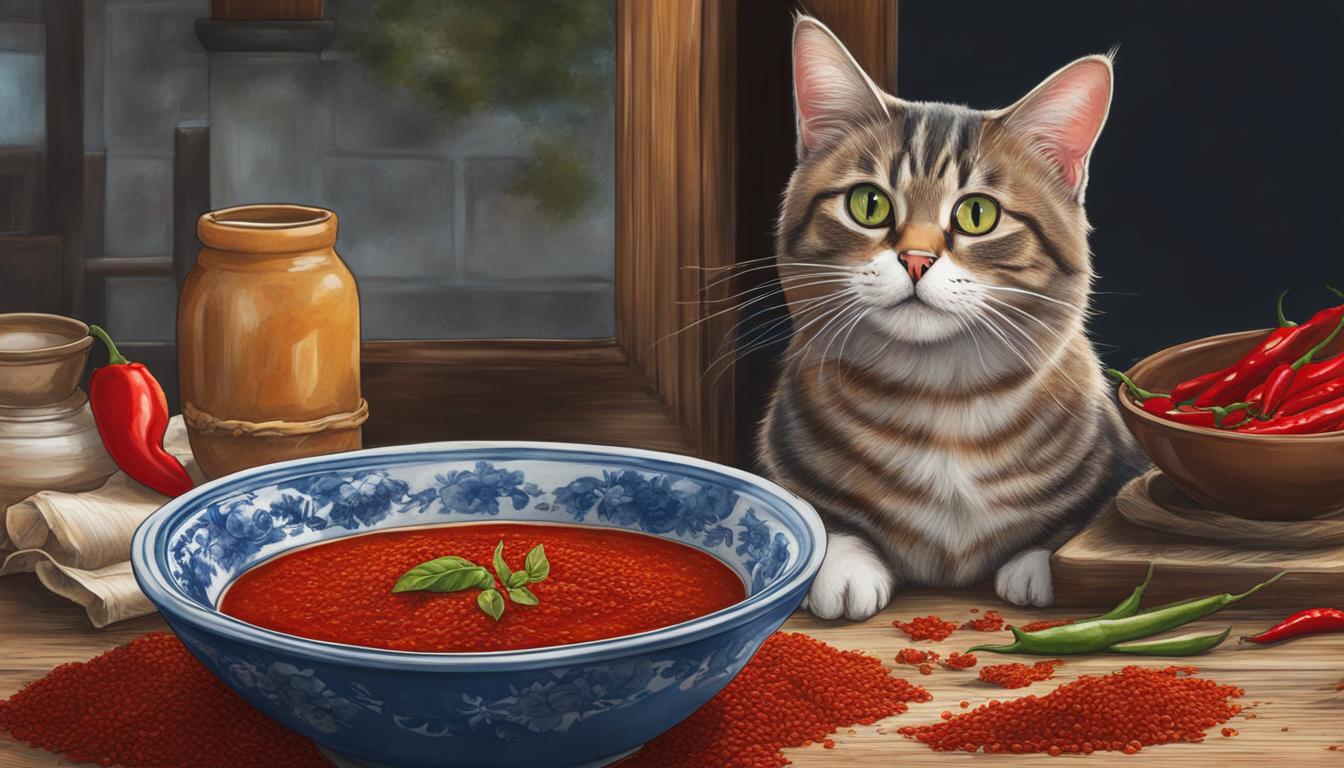As a curious cat owner, you may have wondered if your feline friend can indulge in the same breakfast delights as you. But when it comes to raw eggs, it’s important to approach with caution. While we may happily devour a runny yolk, the same cannot be said for our whiskered companions.
Raw eggs can pose potential dangers to cats, both in terms of bacterial contamination and nutrient absorption. Plus, nobody wants to risk a food poisoning fiasco with their furry friend! So, let’s dive deeper into whether cats can eat raw eggs and uncover the safest way to incorporate eggs into their diet.
Key Takeaways:
- Raw eggs can contain harmful bacteria like salmonella, posing a risk of food poisoning for cats.
- Avidin, an enzyme found in raw eggs, can hinder a cat’s ability to absorb biotin, an essential nutrient for their skin and coat health.
- Cats are better off enjoying cooked eggs as a safer alternative, such as boiled or scrambled eggs without any added seasonings or additives.
- Remember to consult with a veterinarian before introducing any new foods to your cat’s diet.
- Eggs can be a nutritious addition to a cat’s diet when fed in moderation, providing essential protein and vitamins.
Can Cats Have Boiled Eggs?
When it comes to feeding cats eggs, many pet owners wonder if boiled eggs are a safe option. The good news is that boiled eggs can be a nutritious addition to a cat’s diet when prepared correctly. They offer a range of benefits and can be enjoyed as an occasional treat.
The first thing to note is that boiled eggs should be offered to cats without any added seasonings or salt. Cats have different dietary requirements than humans, and seasonings can be harmful to their health. It’s best to keep the eggs plain and simple.
Boiled eggs can provide cats with essential nutrients, including protein and important vitamins. Protein is crucial for cats’ overall health and helps support their muscle development. Vitamins like B2 and B12 are also found in eggs, and they contribute to a cat’s skin and coat health.
| Egg Benefits for Cats | Details |
|---|---|
| Protein | Helps with muscle development |
| Vitamins B2 and B12 | Contributes to skin and coat health |
It’s important to note that while boiled eggs can be a healthy addition to a cat’s diet, they should not be the sole source of nutrition. Cats require a balanced diet that includes a variety of proteins, fats, and carbohydrates. It’s always best to consult with a veterinarian before making any significant changes to a cat’s diet.
In conclusion, boiled eggs can be a safe and nutritious treat for cats when prepared correctly. They offer protein and important vitamins that contribute to a cat’s overall well-being. However, it’s crucial to remember that eggs should be given in moderation and should not replace a balanced commercial cat food diet. With a veterinarian’s guidance, owners can incorporate boiled eggs into their cat’s occasional snack rotation to provide a tasty and beneficial addition to their nutrition.
Can Cats Eat Eggshells?
When it comes to feeding cats eggs, the focus is usually on the yolk and the white. However, some cat owners wonder if it’s safe for their furry friends to consume eggshells as well. While eggshells do contain valuable nutrients like calcium, it is generally recommended to avoid feeding them to cats.
Eggshells can pose a choking risk if given to cats in large pieces. To prevent any potential discomfort or choking hazards, it is best to remove the eggshell entirely before offering eggs to your cat. Additionally, cats can obtain the necessary vitamins and minerals from other sources in their diet, so feeding them eggshells is not necessary.
Remember, the key to providing a balanced diet for your cat is variety. Along with commercial cat food, you can incorporate other safe and nutritious foods into their diet. If you’re considering adding eggs to your cat’s meals, focus on the cooked yolk and white, as they provide essential nutrients like protein and vitamins.
Although eggshells may seem like a natural addition to a cat’s diet, it’s best to err on the side of caution and avoid feeding them to your feline friend. Instead, stick to offering your cat properly cooked eggs in moderation, and consult with a veterinarian for personalized dietary advice.
The Benefits of Eggs in a Cat’s Diet
Eggs can be a nutritious addition to a cat’s diet when prepared and fed correctly. They provide important nutrients like protein, as well as essential vitamins and minerals that promote overall health and well-being. However, it’s essential to follow safe egg preparation practices and feed eggs to cats in moderation.
| Nutrient | Amount | Benefits |
|---|---|---|
| Protein | High | Aids in muscle development and repair |
| Vitamin B12 | Good source | Supports healthy nervous system function |
| Vitamin B2 (Riboflavin) | Good source | Essential for energy metabolism |
Feeding your cat eggs in moderation can provide these nutritional benefits, but it should never replace a complete and balanced commercial cat food diet. Always consult with your veterinarian before introducing any new foods to your cat’s diet to ensure their specific nutritional needs are met.
Can Kittens Eat Eggs?
When it comes to kittens and eggs, many cat owners wonder if it’s safe to introduce this protein-packed treat into their diet. The good news is that kittens can indeed enjoy eggs as part of their balanced diet, but there are a few important factors to consider.
Firstly, it’s crucial to ensure that the eggs given to kittens are fully cooked. Raw eggs can pose a risk of bacterial infections, which can be particularly dangerous for their developing immune systems. Opt for hard-boiled or scrambled eggs that are thoroughly cooked to eliminate any potential health hazards.
Secondly, it’s important to avoid adding any additional ingredients to the eggs. While seasonings and additives may enhance the flavor for us humans, they can be harmful to kittens. Stick to plain, unseasoned eggs to ensure their safety.
| Egg Benefits for Kittens |
|---|
| 1. Protein: Eggs are rich in protein, which is essential for a kitten’s growth and development. |
| 2. Vitamins and Minerals: Eggs contain important vitamins and minerals that contribute to a kitten’s overall health. |
| 3. Taste and Variety: Introducing eggs to a kitten’s diet can provide a new and tasty experience, adding variety to their meals. |
Remember, while eggs can provide nutritional benefits to kittens, they should be given in moderation as a treat rather than a primary food source. It’s always best to consult with a veterinarian before making any significant changes to your kitten’s diet.
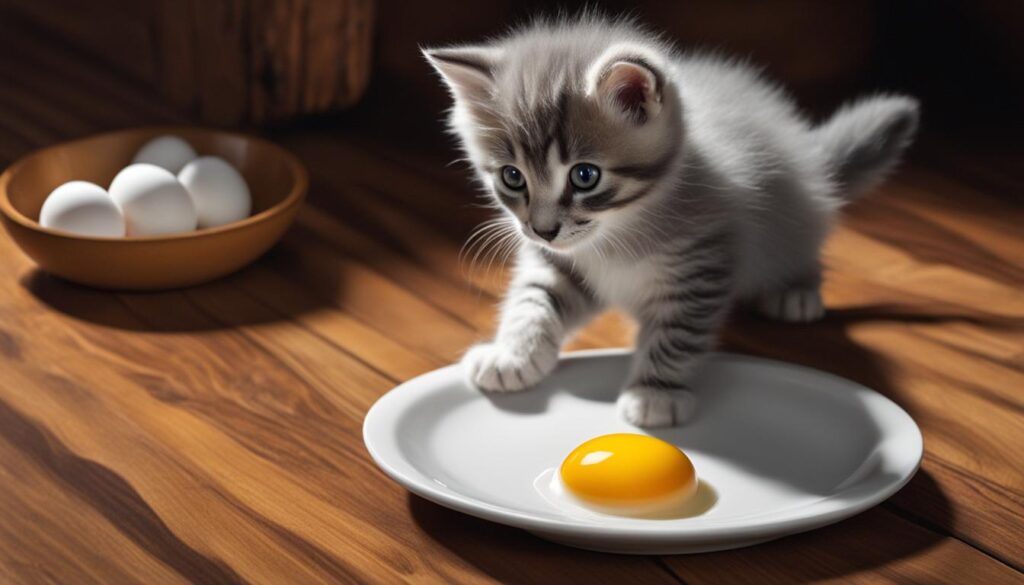
The Best Way to Feed Your Cat Eggs
When it comes to feeding your cat eggs, there are a few important considerations to keep in mind. While eggs can be a nutritious addition to your cat’s diet, it’s crucial to prepare them in a safe and suitable manner. Here are some tips on the best way to feed your cat eggs:
1. Stick to Boiled or Scrambled Egg Whites
When offering eggs to your cat, it’s best to provide boiled or scrambled egg whites without any added seasoning or salt. Egg whites are high in protein and can be a healthy snack for your feline friend. Be sure to thoroughly cook the eggs to eliminate any potential risks of bacterial infections. Once cooked, cool the eggs to room temperature before serving.
2. Incorporate Eggs Into Your Cat’s Regular Food
Instead of feeding eggs as a standalone meal, consider mixing a small amount of boiled or scrambled egg whites with your cat’s regular food. This ensures that your cat receives a balanced diet while still enjoying the nutritional benefits of eggs. Remember to consult with a veterinarian before introducing any new foods to your cat’s diet, especially if your cat has any pre-existing health conditions.
3. Feed Eggs as an Occasional Treat
While eggs can provide essential nutrients for your cat’s health, it’s important to offer them as an occasional treat rather than a primary source of nutrition. Cats have specific dietary requirements that are best met through a complete and balanced commercial cat food. Eggs should be a supplement to their diet, not the main course. Moderation is key to maintaining a healthy and well-rounded meal plan for your cat.
By following these guidelines, you can ensure that your cat benefits from the nutritional value of eggs while minimizing any potential risks. Remember to prioritize your cat’s overall health and consult with a veterinarian if you have any concerns or questions about incorporating eggs into their diet.
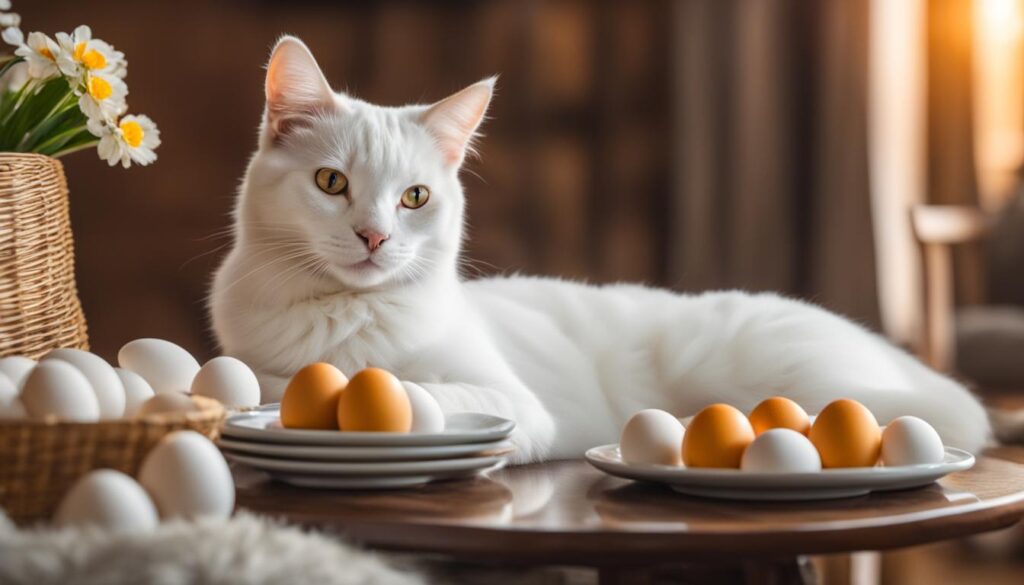
Are Eggs Nutritious for Cats?
Eggs can be a valuable addition to a cat’s diet, providing essential nutrients and promoting overall health. Let’s take a closer look at the nutritional value of eggs for felines and the differences between egg yolks and egg whites.
Egg Yolk vs. Egg White
Egg yolks and egg whites contain different nutrients, and cats can benefit from both parts of the egg. The yolk is rich in essential fatty acids, vitamins A, D, and E, and minerals like phosphorus and selenium. These nutrients contribute to a cat’s skin and coat health, immune function, and overall well-being.
The egg white, on the other hand, is a great source of high-quality protein. It provides all the essential amino acids that cats need for muscle development, tissue repair, and energy production. Protein is especially important for kittens and active adult cats.
The Nutritional Value of Eggs for Felines
Eggs offer a range of vital nutrients that can support a cat’s overall health:
- Protein: Eggs are packed with protein, which is crucial for muscle development and repair.
- Vitamins: Eggs contain vitamins A, D, E, and B vitamins like riboflavin and B12. These vitamins support various bodily functions, including vision, cell growth, immune health, and energy metabolism.
- Minerals: Eggs provide minerals such as phosphorus, selenium, and iron, which are important for bone health, antioxidant defense, and oxygen transport.
- Fatty Acids: The egg yolk contains omega-3 and omega-6 fatty acids, which can contribute to a cat’s skin and coat health, joint function, and overall inflammation control.
| Egg Nutrients | Egg Yolk | Egg White |
|---|---|---|
| Protein | ✓ | ✓ |
| Vitamin A | ✓ | – |
| Vitamin D | ✓ | – |
| Vitamin E | ✓ | – |
| B Vitamins | ✓ | – |
| Phosphorus | ✓ | – |
| Selenium | ✓ | – |
| Iron | ✓ | – |
| Omega-3 Fatty Acids | ✓ | – |
| Omega-6 Fatty Acids | ✓ | – |
“Eggs provide a range of essential nutrients that support a cat’s overall health, including protein, vitamins, minerals, and fatty acids. Both the yolk and the white offer unique benefits, with the yolk being rich in essential fatty acids and the white providing high-quality protein.”
While eggs can be a nutritious addition to a cat’s diet, it’s important to feed them in moderation and prepare them properly. Avoid giving cats raw eggs, as they can pose a risk of bacterial contamination. Stick to cooked eggs without seasoning or additives. Always consult with a veterinarian before making any changes to your cat’s diet.
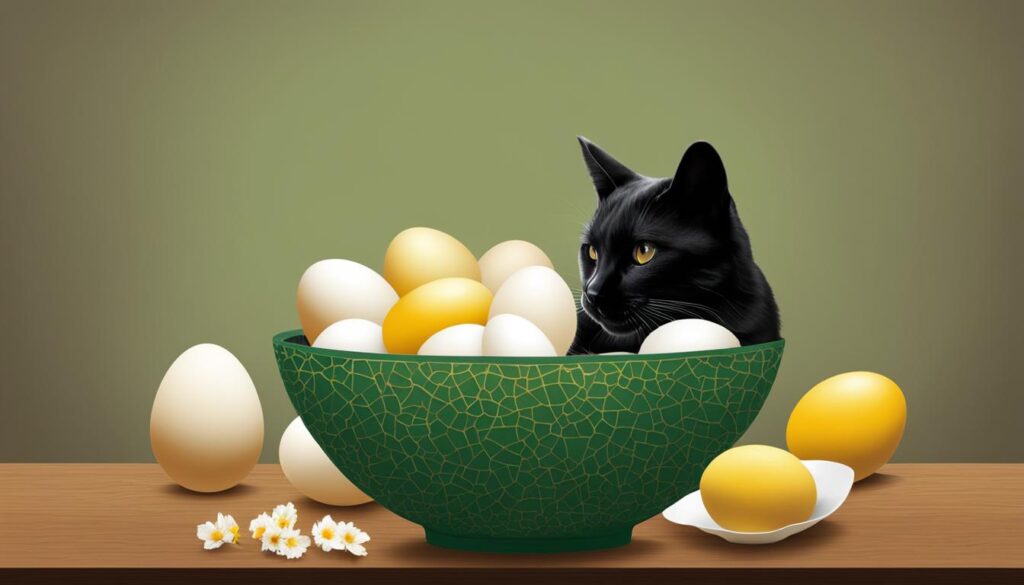
Are There Any Risks to Feeding Cats Eggs?
Cats can enjoy the occasional treat of cooked eggs, but it’s important to be aware of the potential risks involved. One risk is the presence of bacteria like salmonella in raw eggs, which can cause food poisoning in cats. It’s best to avoid feeding raw eggs to cats to prevent any potential health issues.
Another risk to consider is the possibility of egg allergies in cats. Just like humans, cats can develop allergies to certain foods, including eggs. If your cat experiences digestive upset or other adverse reactions after consuming eggs, it may be allergic to them. In such cases, it’s recommended to refrain from feeding eggs to your cat.
When feeding cats cooked eggs, it’s crucial to follow proper food safety guidelines. Eggs should be thoroughly cooked to eliminate any bacteria, and it’s essential to avoid adding any seasonings or additives that could be harmful to cats. Additionally, monitoring your cat for any signs of gastrointestinal problems after consuming eggs is important to ensure their well-being.
All in all, while cooked eggs can be a nutritious and tasty addition to a cat’s diet, it’s essential to be mindful of the potential risks, such as the presence of bacteria in raw eggs and the possibility of egg allergies. As responsible pet owners, we should prioritize our cats’ safety and well-being by feeding them eggs in moderation and by consulting with a veterinarian if we have any concerns or questions.
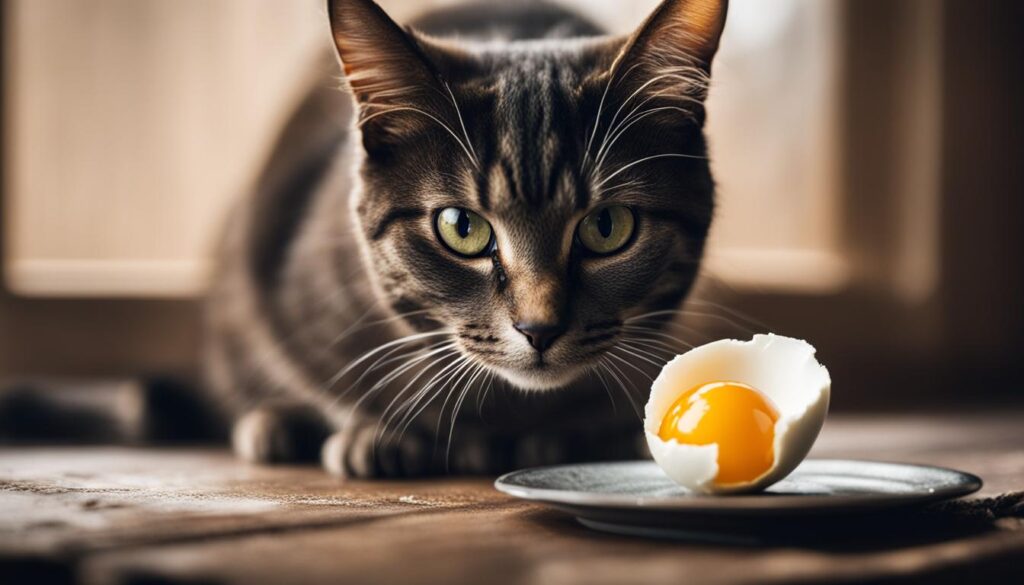
Conclusion
As a cat owner myself, I can’t help but wonder about the possibilities of mixing eggs in my feline friend’s food or creating homemade egg-based treats. While cooked eggs can indeed be a delightful addition to a cat’s diet, it is essential to remember that they should not be relied upon as the sole source of nutrition.
Eggs can be a wonderful occasional treat for your cat. Whether you choose to mix them in with their regular food or whip up some delicious homemade treats, it’s important to use moderation and balance. Cats thrive on a complete and balanced commercial diet formulated by experts in veterinary nutrition.
So, go ahead and treat your feline companion to a taste of eggs every now and then. Just remember to stick to the safe ways of preparing eggs for cats and always consult with your veterinarian before introducing any new food into their diet. With a little creativity and care, you can give your cat a delectable and nutritious experience.
FAQ
Can cats eat raw eggs?
No, cats should not be fed raw eggs. Raw eggs can contain bacteria like salmonella, which can cause food poisoning in cats. Raw eggs also contain avidin, an enzyme that can interfere with a cat’s ability to absorb biotin, a vital nutrient for their skin and coat health. It is safer to feed cats cooked eggs rather than raw eggs.
Can cats have boiled eggs?
Yes, cats can have boiled eggs as an occasional treat. Hard-boiled eggs can be offered to cats on their own or mixed in with their regular cat food. The eggs should be cooked without any added seasonings or salt. It is important to remove the eggshell to prevent a choking hazard. Boiled eggs can provide some nutritional benefits to a cat’s diet, including protein and essential vitamins.
Can cats eat eggshells?
It is safer to avoid feeding eggshells to cats to prevent any potential discomfort or choking. While eggshells contain vitamins and minerals, it is not necessary to feed them to cats as they can obtain these nutrients from other sources. Eggshells can also pose a choking risk if given in large pieces.
Can kittens eat eggs?
Yes, kittens can enjoy eggs as a nutritious treat. Hard-boiled or scrambled eggs can be given to kittens in moderation. It is important to avoid adding any additional ingredients like cheese, garlic, or salt. The eggs should be thoroughly cooked to eliminate any risk of bacterial infections. Eggs can provide essential nutrients for a growing kitten’s development.
What is the best way to feed cats eggs?
When feeding cats eggs, it is best to offer boiled or scrambled egg whites without any added seasoning or salt. The eggs should be cooled to room temperature before serving. Only a small amount of eggs should be added to the cat’s food in the morning or evening. It is important to consult with a veterinarian before introducing any new foods to a cat’s diet.
Are eggs nutritious for cats?
Yes, eggs can be a nutritious addition to a cat’s diet. They are rich in protein and contain essential vitamins like B2 and B12. However, it is important to feed cats eggs in moderation and to avoid giving them raw eggs or eggs with seasonings or additives. The nutrients from eggs can help promote a cat’s skin and coat health.
Are there any risks to feeding cats eggs?
Feeding cats eggs carries some risks. Raw eggs can contain bacteria like salmonella, which can cause food poisoning in cats. Cats may also be allergic to eggs, leading to digestive upset or other adverse reactions. It is best to stick to feeding cats cooked eggs and to monitor them for any signs of gastrointestinal problems after consuming eggs.
Can I use eggs in homemade cat treats?
Yes, eggs can be used in homemade cat treats. However, it is important to follow safe egg preparation methods and avoid adding any ingredients that may be harmful to cats, such as seasonings, salt, or other potentially toxic foods. It is also recommended to consult with a veterinarian for guidance on making homemade treats for your cat.

